Mathematics
| Curriculum Intent and Overview |
|---|
| Our curriculum aims for students to develop enjoyment of Mathematics through development of a relational understanding of the various concepts and the ways in which they can be applied and explored. We aim for students to develop fluency with mathematical knowledge and techniques as well as equip them with the ability to apply these skills in realistic situations. We aim to support students’ conceptual development by exposing them to various models for understanding the structure of Mathematics with the ultimate aim of developing an increasingly secure abstract understanding both for its own sake and for its practical applications. |
|
|
We aim to deliver high quality lessons which inspire, instil confidence and motivate all learners to achieve their best. All our enthusiastic students are able to apply Mathematics in real life situations without limitations or stereotypes.
The Department
Curriculum Leader: Mr J Hughes
Deputy Curriculum Leader: Miss B Soler
KS4 Coordinator: Mrs H Rock
KS3
What will be studied?
Our Year 7 and Year 8 Schemes of Learning focus on building students’ key skills in specific areas and applying these to solve a range of related problems. The level of challenge is high and learning is modelled using a concrete/pictorial/abstract approach to help students develop understanding. Students are organised into broad bands based on prior attainment and teacher assessment. The Year 9 scheme of learning builds on the Year 7-8 content and students will consolidate and extend this understanding as well as encountering some new concepts and topics.
YEAR 7
| AUTUMN | SPRING | SUMMER |
|---|---|---|
|
Sequences |
Developing understanding of calculations |
Geometric Reasoning
|
| Algebraic Notation | Fractions and Percentages of amounts | Developing Number sense |
| Equations | Directed Numbers | Sets and Probability |
| Fractions, Decimals & Percentages | Adding and Subtracting Fractions | Prime Numbers and Proof |
| Geometric Construction | Ratio and Scale | |
| Multiplicative Change |
YEAR 8
| AUTUMN | SPRING | SUMMER |
|---|---|---|
|
Ratio |
Equations & Inequalities |
Angles in parallel lines |
| Multiplicative Reasoning | Sequences | Areas of circles and trapezia |
| The Cartesian Plane | Indices | Line Symmetry and Reflection |
| Representing Data | Fractions & Percentages | Data Handling |
| Probability Tables | Standard Index Form | Measures of Location |
YEAR 9
| AUTUMN | SPRING | SUMMER |
|---|---|---|
|
Straight Line Graphs |
Using Percentages |
Ratio and Proportion |
| Forming and Solving Equations | Maths and Money | Rates |
| Testing Conjectures |
Deduction |
Probability |
| 3D Shapes | Rotation and Translation | Consolidation and Extension |
| Constructions and Congruency | Pythagoras' Theorem | |
| Numbers | Enlargement and Similarity |
St Albans Girls' School regularly enters teams into the UKMT Maths Challenges which allow students to test their problem-solving skills in a national competition. Our students regularly receive Gold awards and in recent years we have had students qualify for Olympiads as a result of exceptional performance in these challenges.
How can I support my child?
- Mathswatch has a range of explanatory videos and home learning tasks to support the learning taking place in class
- Dr Frost Maths has all of our courses available to students who are logged in, and they can practice key skills and watch videos to support their learning
- Encourage your child to practice their mental maths regularly by asking her what the time is, how much something will cost, how much change to expect etc.
- Encourage them to attend Maths Clubs to ask questions and get support from their class teacher
How are students assessed at KS3?
- Small class assessments at the end of each topic
- Regular skills quizzes
- End of term assessments that will include everything they have learnt so far that year
- In lessons students will be assessed by questioning, classwork and home learning tasks.
What equipment is needed?
A calculator (recommended to the same standard as the Casio fx-83GTX or fx-85GTX as this will be adequate through to year 11), protractor, pair of compasses, ruler, pen and pencil are essential at all times. Students will also need a ring-binder to organise their classwork, home learning and assessments; dividers will be provided.
GCSE
Exam Board: Edexcel
Specification Number: 1MA1
What will be studied?
At GCSE in Maths we aim to equip students with the necessary mathematical skills to solve real life problems. Students learn through a mastery approach regularly recapping knowledge and introducing new ideas to known concepts.
Students will study Edexcel’s (9-1) Maths specification at either Higher or Foundation tier. The only maths assessments are 3 exams at the end of Year 11. One non-calculator paper and 2 calculator papers. In Years 10 and 11 all students are given the opportunity to buy Edexcel revision materials through the school at a discounted price.
The highest attaining students are offered the opportunity to take part in the UKMT challenges. These build resilience and a chance for students to develop their problem solving skills. Successful students will be awarded with a Bronze, Silver or Gold certificate and could be asked to progress to the next round.
Students on course for a grade 8 or 9 will be given the opportunity to study for a Level 2 Certificate in Further Mathematics (AQA exam board) which offers them an opportunity to explore concepts found in A Level Maths and Further Maths. This qualification places an emphasis on higher order technical proficiency, rigorous argument and problem solving skills, it also gives an introduction to calculus and matrices and develops further skills in trigonometry, functions and graphs.
How is the course assessed?
There are 3 exam papers at the end of Year 11. They are equally weighted and each last 1hr 30mins with 80 marks available in each. The first paper is a non-calculator paper and students have access to a calculator in the following two.
Throughout the course we have termly internal assessments based closely on exam-board materials to help identify areas of success and areas for improvement; these do not contribute to a final grade.
What texts are recommended?
We have the Edexcel recommended textbook in school. All students have a password for https://www.pearsonactivelearn.com that can be used to access an online version of the book.
Revision guides are offered by the school each year along with other revision materials.
We also recommend the following books for students interested in wider reading around the subject:
- Alex’s Adventures in Numberland - Alex Bellos
- The Curious Incident of the Dog in the Night Time - Mark Haddon
- Fermat’s Last Theorem – Simon Singh
- Humble Pi – Matt Parker
What websites are recommended?
MathsWatch has a range of videos to explain new topics as well as revise previous ones.
Google Classroom contains exam papers organised by topic or grade as well as past papers to aid current learning as well as revision.
MathsBot generates exam papers and worksheets with worked solutions targeted to topics and tiers.
Corbettmaths provides alternative videos to MathsWatch, as well as loads of sample questions and worked solutions.
Maths Genie offers highly grade-focused videos and exam questions/solutions.
Dr Frost Maths has access to our GCSE course for all logged in students, and they can practice Key Skills and Exam Questions for each unit.
What equipment is needed?
A scientific calculator (recommended to the same standard as the Casio fx-83GTX or fx-85GTX), protractor, a pair of compasses, ruler, pen and pencil are essential at all times. Students will also need a ring-binder to organise their classwork, home learning and assessments; dividers will be provided.
A Level Courses
A Level Mathematics
Exam Board: Edexcel
Specification Number: 9MA0
Entry Requirements: GCSE Mathematics High Grade 6 (Grade 7 or above strongly advised)
Maths A level includes 3 areas, Pure, Statistics and Mechanics. A second A level of Further Maths is available to qualifying students.
Both Maths and Further Maths A level follow the Edexcel syllabus and are examined at the end of Year 13. An AS in Further Maths is available at the end of year 12.
Pure Maths for A level includes proof, algebra and functions, coordinate geometry in the (x, y) plane, sequences and series, trigonometry, exponentials and logarithms, differentiation, integration, numerical methods and vectors.
Statistics includes statistical sampling, data presentation and interpretation, probability, statistical distributions and statistical hypothesis testing.
Mechanics includes quantities and units in mechanics, kinematics, forces and Newton's laws, and moments.
How is the course assessed?
This course is examined at the end of Year 13 over three equally weighted papers with a total of 300 marks available.
Paper 1 and Paper 2: Pure Mathematics 1 and 2
Each paper is a 2-hour written examination worth 100 marks. Paper 1 and Paper 2 may contain questions on any topics from the Pure Mathematics content. Calculators can be used in the assessment.
Paper 3 : Statistics and Mechanics
This paper is a 2-hour written examination also worth 100 marks. Paper 3 will contain questions on topics from the Statistics content in Section A and Mechanics content in Section B. Calculators can be used in the assessment.
A Level Further Mathematics
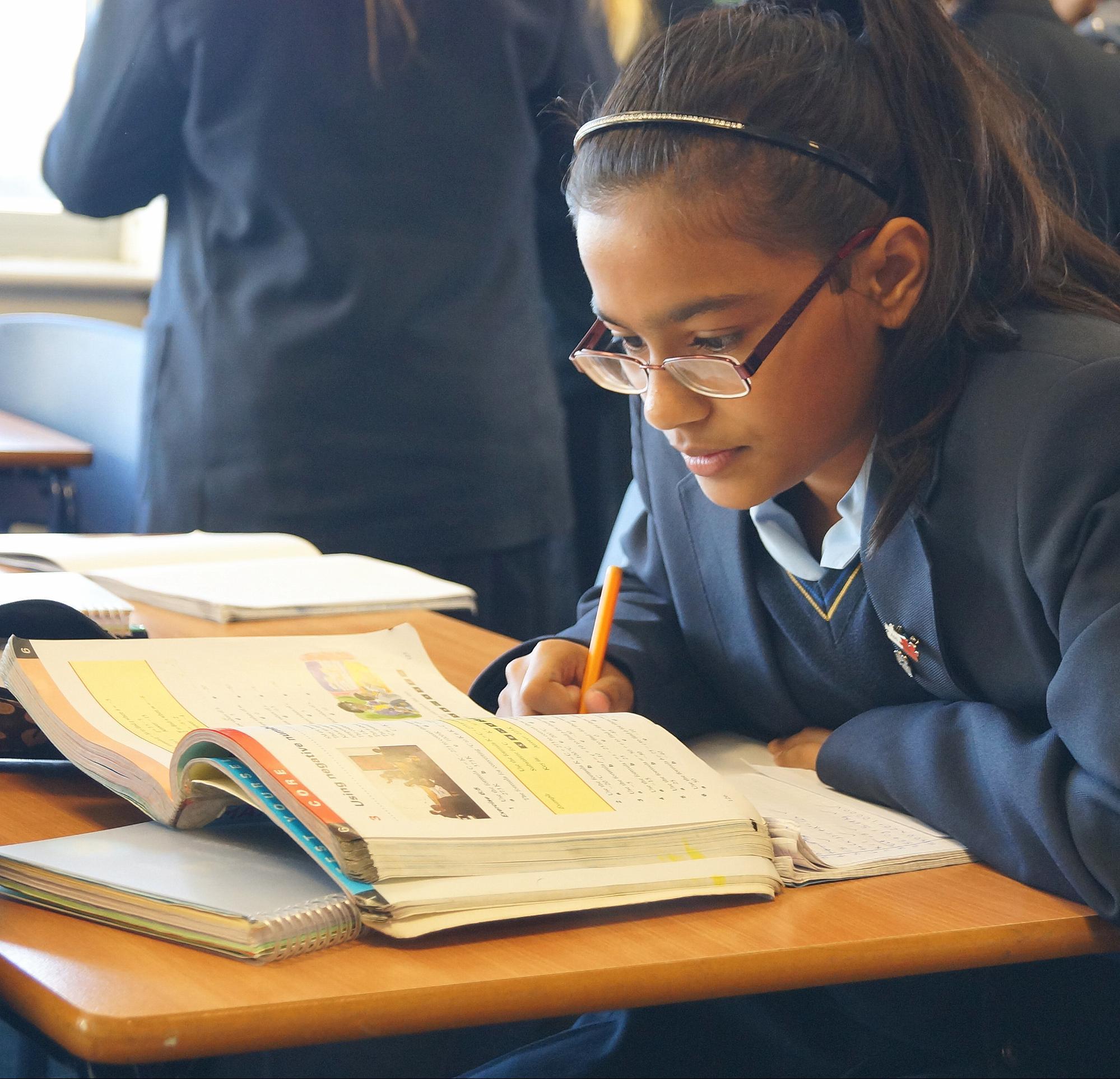
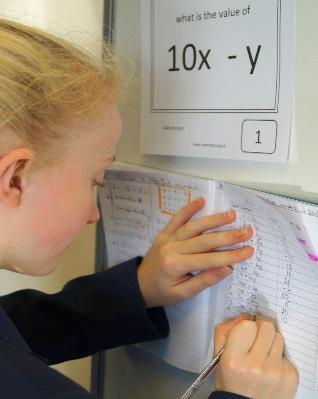
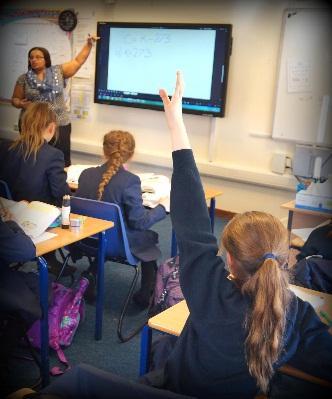
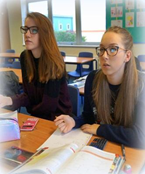
Exam Board: Pearson Edexcel
Specification Number: 9FM0 (8FM0 for AS Further Maths)
Entry Requirements: GCSE Mathematics Grade 8 or 9
Course Content:
This course builds on the skills, knowledge and understanding set out in the whole GCSE subject content for mathematics and the subject content for Mathematics A Level taught alongside. Assessment is designed to reward students for demonstrating the ability to provide responses that draw together different areas of their knowledge, skills and understanding from across the full course of study for the AS further mathematics qualification and also from across the AS Mathematics qualification. Problem solving, proof and mathematical modelling will be assessed in further mathematics in the context of the wider knowledge which students taking A level further mathematics will have studied.
The course currently consists of Core Pure Maths and Applied Maths (Decision Maths and Further Mechanics).
At the end of year 12 there is an opportunity to take the AS qualification, details of which are shared with students where appropriate.
How is the course assessed?
This course is examined at the end of Year 13 over four equally weighted papers with a total of 300 marks available.
Paper 1 and Paper 2: Core Pure Mathematics 1 and 2
Each paper is a 1 hr and 30 minutes written examination worth 75 marks. Paper 1 and Paper 2 may contain questions on any topics from the Core Pure Mathematics content. Calculators can be used in the assessment.
Core Pure Mathematics includes proof, complex numbers, matrices, further algebra and functions, further calculus, further vectors, polar coordinates, hyperbolic functions and differential equations.
Paper 3 : Further Mechanics 1
This paper is a 1 hr and 30 minutes written examination worth 75 marks. Calculators can be used in the assessment.
Further Mechanics 1 includes momentum and impulse; work energy and power; elastic strings and springs and elastic energy and elastic collisions.
Paper 4 : Decision Mathematics 1
This paper is a 1 hr and 30 minutes written examination worth 75 marks. Calculators can be used in the assessment.
Decision Mathematics includes algorithms and graph theory, algorithms on graphs, critical path analysis and linear programming.
Why Mathematics or Further Mathematics At St Albans Girls’ School?:
- We have experienced Maths and Further Maths teachers who are able to help with all aspects of the course.
- We are able to offer support for STEP and MAT and general preparation for Mathematics at university.
Expectations of Students:
The students are expected to spend at least four hours per week in private study for each qualification they are taking.
Home learning tasks normally will be set each week. Students will be expected to take a great deal of responsibility for their own learning and to ask questions and participate in class discussions.
What equipment is needed?
A calculator of the same standard as the Casio fx-991 which is capable of working with complex numbers and matrices, a protractor, a pair of compasses, ruler, pen and pencil. Students will also need a ring-binder to organise their notes, classwork, home learning and assessments.
Career Paths:
Maths is one of the most popular and desirable A Levels and is essential for most STEM subjects at University as well as developing and demonstrating wider skills valuable for a diverse range of University courses and careers. Further Mathematics is most desirable if you intend to study Mathematics, Engineering or Physics at University.
Extra curricular activities
Maths club is available to all sixth form students to work through classwork, new ideas, homework or preparation work. There is always at least one experienced A level maths teacher on hand to help students.
There is additional STEP preparation support through a small club. Student are encouraged to try problems and research the most recent mathematical developments. There are a variety of lectures and workshops run by the Further Maths Support Programme across Hertfordshire. These include opportunities to prepare for STEP exams. Students are given the opportunity to enter the UKMT senior individual challenge as well as the team challenge.
What texts are recommended?
We have the Edexcel recommended textbook in school. All students have a password for https://www.pearsonactivelearn.com that can be used to access an online version of the book.
Wider reading list:
- The Simpsons and Their Mathematical Secrets – Simon Singh
- From 0 to infinity in 26 Centuries – Chris Waring
- The Music of Primes – Marcus Du Sautoy
- Fermat’s Last Theorem – Simon Singh
- How to Bake Pi – Eugenia Cheng
- Seventeen Equations that Changed the Word – Ian Stewart
- Humble Pi - Matt Parker
- Hello World - Hannah Fry
- The Indisputable Existence of Santa Claus - Hannah Fry
- Acheson, David 1089 and All That (2002), The Calculus Story (2017)
- Bellos, Alex Alex’s Adventures in Numberland (2010)
- Clegg, Brian A Brief History of Infinity (2003)
- Courant, Robbins and Stewart What is Mathematics? (1996)
- Devlin, Keith Mathematics: The New Golden Age (1998), The Millennium Problems (2004), The Unfinished Game (2008)
- Dudley, Underwood Is Mathematics Inevitable? A Miscellany (2008)
- Elwes, Richard MATHS 1001 (2010), Maths in 100 Key Breakthroughs (2013)
- Gardiner, Martin The Colossal Book of Mathematics (2001)
- Gowers, Tim Mathematics: A Very Short Introduction (2002)
- Hofstadter, Douglas Gödel, Escher, Bach: an Eternal Golden Braid (1979)
- Körner, T. W. The Pleasures of Counting (1996)
- Neale, Vicky Closing the Gap: the quest to understand prime numbers (2017)
- Odifreddi, Piergiorgio The Mathematical Century: The 30 Greatest Problems of the Last 100 Years (2004)
- Piper, Fred & Murphy, Sean Cryptography: A Very Short Introduction (2002)
- Polya, George How to Solve It (1945)
- Sewell, Michael (ed.) Mathematics Masterclasses: Stretching the Imagination (1997)
- Singh, Simon The Code Book (2000), Fermat’s Last Theorem (1998)
- Stewart, Ian Letters to a Young Mathematician (2006), 17 Equations That Changed The World (2012)
Bridging Material:
- Alcock, Lara How to Study for a Mathematics Degree (2012)
- Allenby, Reg Numbers and Proofs (1997)
- Earl, Richard Towards Higher Mathematics: A Companion (2017)
- Houston, Kevin How to Think Like a Mathematician (2009)
- Liebeck, Martin A Concise Introduction to Pure Mathematics (2000)
What websites are recommended?
There are a variety of websites used by the maths department. The most recommended include
www.desmos.com and www.geogebra.com are graphing websites that allow students to explore the shapes of graphs.
vle.mathswatch.com has a range of videos to explain new topics as well as revised previous ones.
Dr Frost Maths has access to our A Level courses for all logged in students and they can practice Key Skills and Exam Questions for each unit
www.physicsandmathstutor.com has a wide library of exam questions sorted by difficulty, topic and old exam papers.
Numberphile and Stand-up Maths are excellent and interesting YouTube channels on Mathematics
Level 3 Certificate in Mathematical Studies (Core Maths)
Exam Board: AQA
Specification Number: 1350
Entry Requirements: GCSE Mathematics Grade 4
Course Content:
Equivalent to an AS Level
Compulsory Content:
- Analysis of Data - builds on GCSE Statistics content
- Maths for Personal Finance - Taxes, savings and interest rates
- Estimation - Uses ideas from GCSE to make estimations about the real world
- Critical Analysis of given Data and Models - commenting on claims about data using critical thinking and data analysis skills
Optional Content:
- Statistical Techniques - developing knowledge of the Normal Distribution, more advanced Probability and Correlation
- Links to Science and Social Science
OR
- Critical Path and Risk Analysis - techniques to solve logistical problems (planning complex projects), using probability (Venn and Tree diagrams) to make predictions, cost/benefit and risk analysis
- Links to Business, Economics and many careers
How is the course assessed?
This course is assessed through two Examination Papers at the end of year 13. Each paper is 1hr 30 minutes and out of a total of 60 marks and they are equally weighted.
Paper 1:
- Analysis of Data - builds on GCSE Statistics content
- Maths for Personal Finance - Taxes, savings and interest rates
- Estimation - Uses ideas from GCSE to make estimations about the real world
Paper 2:
- Critical Analysis of given Data and Models - commenting on claims about data using critical thinking and data analysis skills
- All optional content
Why Core Maths At St Albans Girls’ School?:
We have experience of teaching Core Maths and strong links with other departments where the skills learned in Core Maths are particularly relevant. Core Maths provides significant support to students encountering applications of Mathematics in their chosen post-16 courses. The course is worth up to 20 UCAS points (equivalent to AS) and can form a part of a University offer. It is particularly advantageous to anyone wishing to study any course with a strong Numeracy component including (but not limited to); Sports Science, PE, Psychology, Health and Social Care, Geography, Sociology, Business, Economics, Biology or Environmental Science. Students will also develop skills with critically analysing numerical data or information as presented in the media or other reports.
Expectations of Students:
The students are expected to spend at least two hours per week in private study for each qualification they are taking.
Home learning tasks normally will be set each week and lesson content will frequently rely on students having prepared in advance in order to get the most out of the lessons.
What equipment is needed?
A scientific calculator (recommended to the same standard as the Casio fx-83GTX or fx-85GTX, but you may wish to use the more advanced fx-991), ruler, pen and pencil are essential at all times. A laptop/tablet/Chromebook would be useful but it is not essential
Folder with dividers and lined or squared paper.
Career Paths:
Skills learned in Core Maths are directly applicable in many diverse career areas including in the Finance sector, Social Studies Research, Business Analysis, Medicine and Engineering. The skills will be relevant in a career in any sector that requires any element of management or analysis.
What texts are recommended?
There are two textbooks available for this course; students will be advised in class as to which one we will be using.
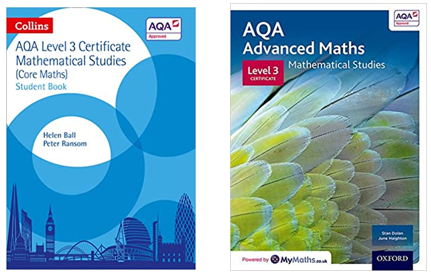
Wider reading list:
- The Tiger That Isn't: Seeing Through a World of Numbers – Andrew Dilnot and Michael Blastland
- Why Do Buses Come in Threes?: The Hidden Maths of Everyday Life – Rob Eastaway and Jeremy Wyndham
- Humble Pi: A Comedy of Maths Errors – Matt Parker
- How to Make the World Add Up: Ten Rules for Thinking Differently About Numbers – Tim Harford
What websites are recommended?
- More or Less from the BBC – This programme is available as a Podcast and takes a critical approach to numbers and statistics in the news
- Nrich – A collection of tasks from the Nrich website relevant to Core Maths
- Risky Talk Podcast – A podcast with Professor Sir David Spiegelhalter; professor of the public understanding of risk